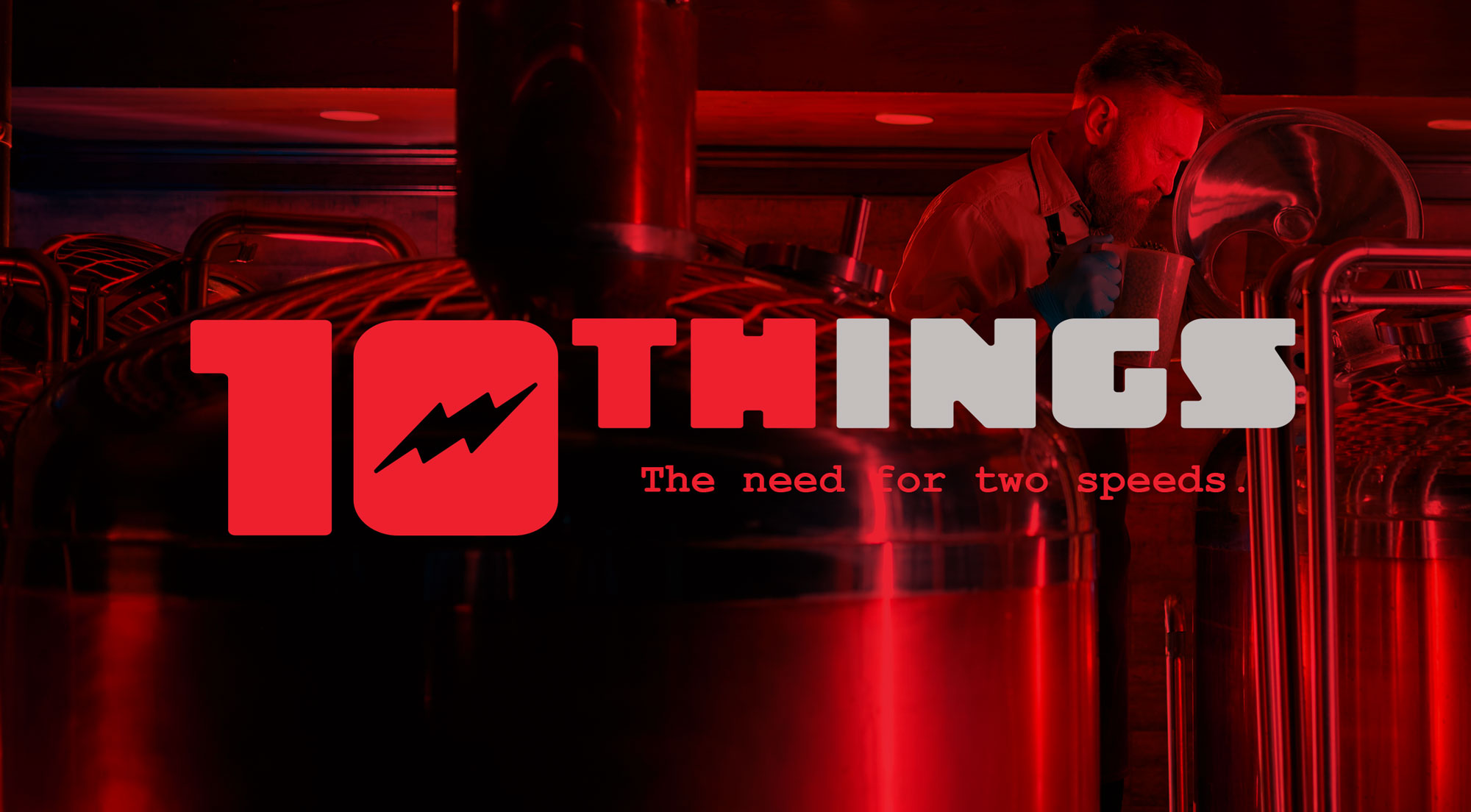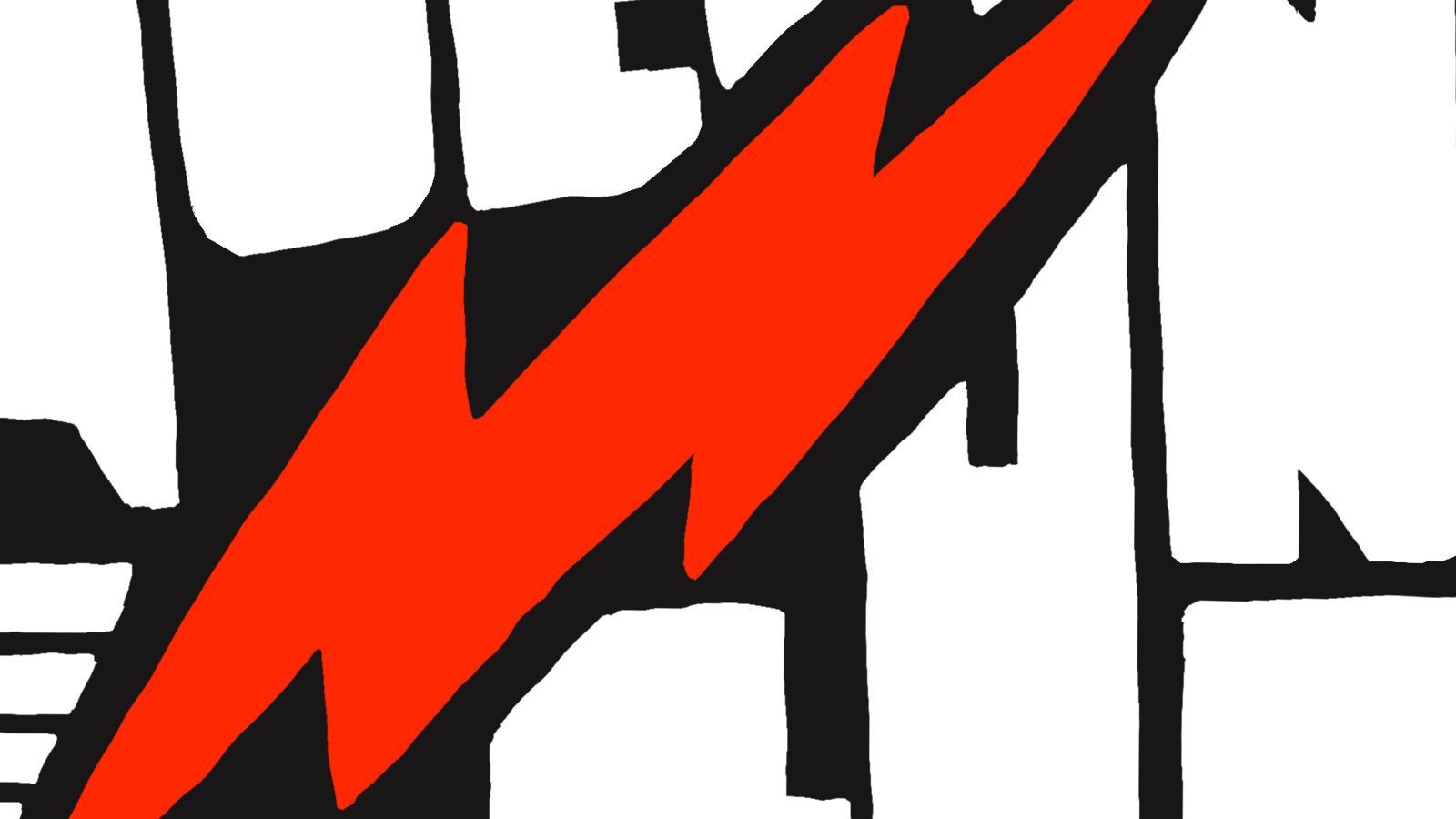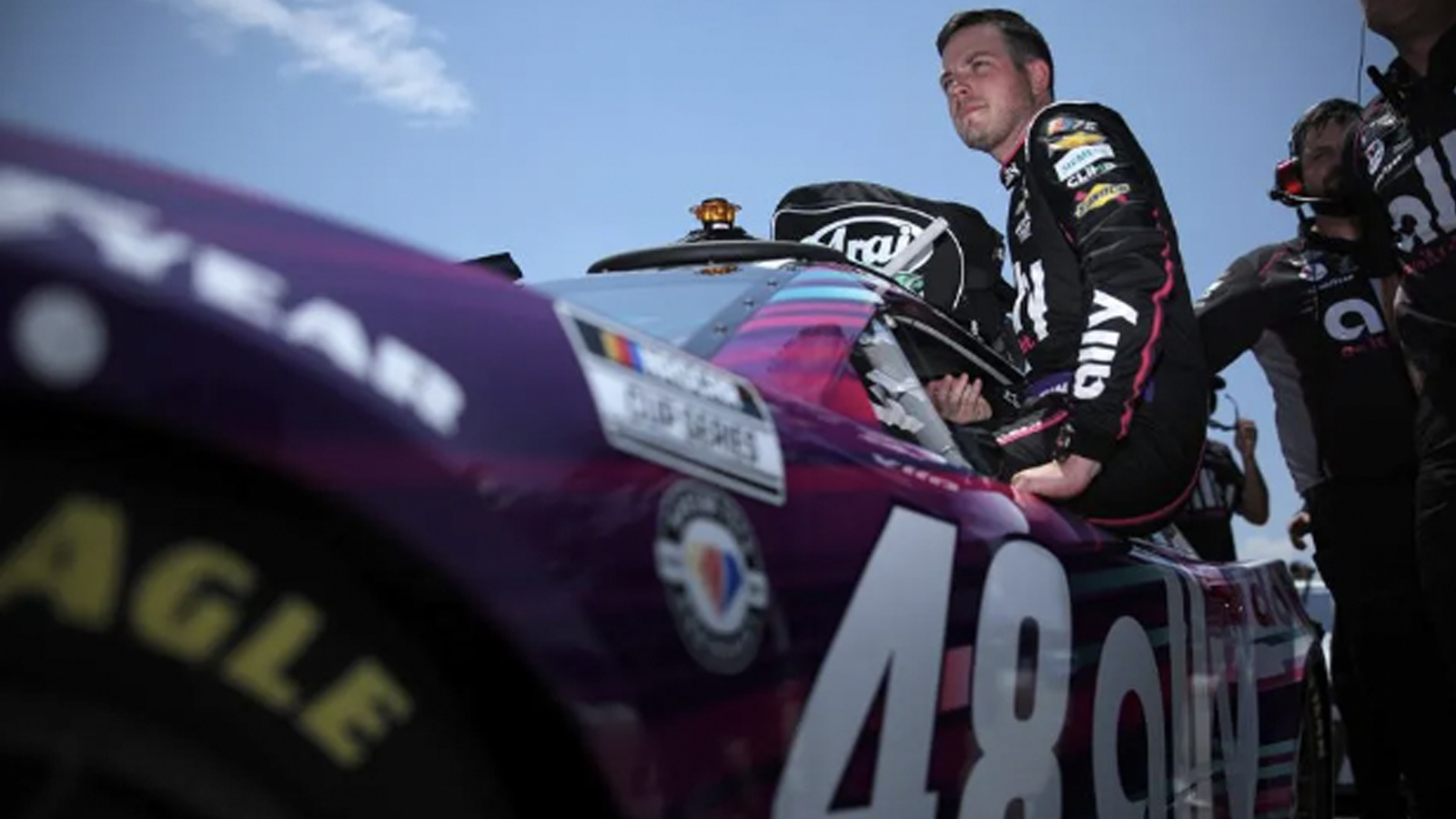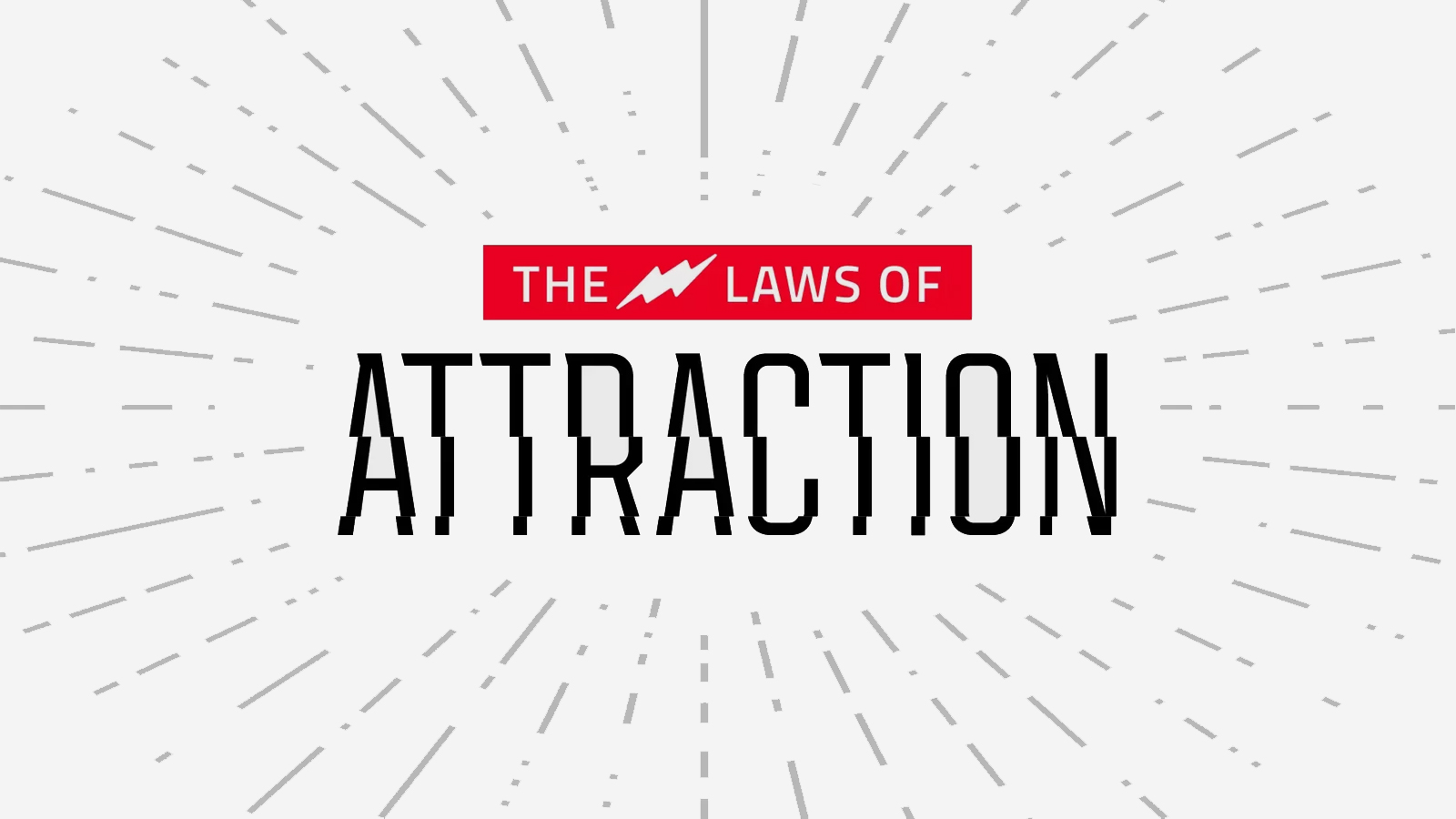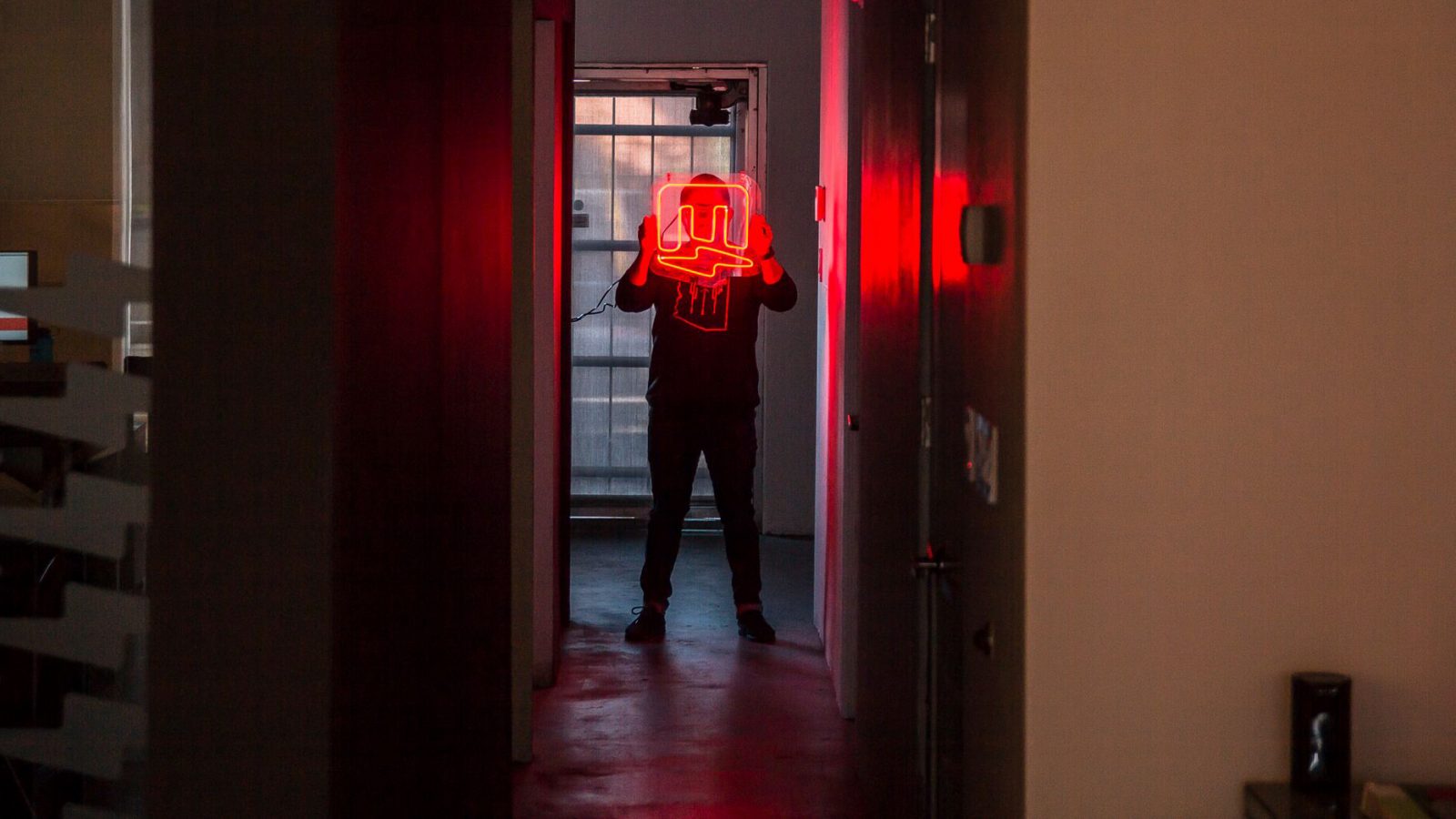Modern advertising requires agencies and clients to move faster than ever. That speed even has some benefits. But don't forget about the power of slow, and moving at two different speeds.
I'm taking this recent merger news as an opportunity to authentically plant our creative freak flag. And cling even more tightly to the things that have always mattered to our little shop. Here's to the rebels.
Requests for Proposals are just part of the agency business, right? Perhaps we should discuss it over lunch, first. Introducing Magnetry's Request For Lunch program in response to an RFPs climate gone wild.
Next Stop Daytona was a program designed to celebrate the intersection of Ally, its NASCAR Racing Program, and Fortnite Creative. Together with a great partner like Ally we were able to merge the metaverse with the physical world while bringing the racing and gaming spaces together for an audience of potential and future digital bank customers.
Our work crossed disciplines and a variety of skillsets from conceptualizing the Fortnite Creative experience and consulting on its design and performance, to creating the Beat Bowman campaign where gamers and racers came together to try and beat NASCAR driver, Alex Bowman's best time on the new virtual track called, The Chaos Course.
We then took the experience of the Chaos Course to the most chaotic track in NASCAR, the famed Daytona International Speedway, where fans could play the game and race viewers from around the world would see Bowman's Ally Arena paint scheme inviting them to play.
"Magnetry formed the concept of the 48 Island in Fortnite Creative. They also developed the designs for the paint scheme and Bowman’s firesuit."
We inherently resist things like formal missions and brand pillars around here, but occasionally we have a need to explain the what and how of Magnetry to those unacquainted. The beauty of our name is that you should get the gist pretty quickly, but the Laws of Attraction highlight the things we know are important and our commitment to them. They are the closest thing we're ever going to have to a values statement, but they aren't exactly written in stone, either. They ebb and flow with the ever-changing world we live in, just like any force of nature.
The laws describe exactly what our clients need to be attractive, they reveal marketing truths, and our steadfast focus on creating magnetism between real humans and the brands they love. These laws are not quite irrefutable - but we have a lot of experience that says they are as close as any law of physics could be — and they work in tandem. You can't adhere to one, the marketing universe requires that you recognize and deal with them all, all at once, all the time.

Law #1. Beauty attracts Attention.
This might seem obvious at first, but your brand has to first look good to get the attention you need. This isn't to say that everything has to be simple or classic, no far from it, beauty is in the eye of the beholder and we'll help shape your physical appearance to match your audience. From crisp brand strategy to a well-crafted and designed tactical campaign, we'll help you turn heads and keep them staring across every possible touchpoint.
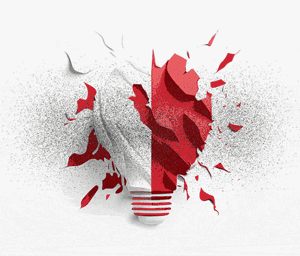
Law #2. Intellect attracts Curiosity.
It's not enough that your marketing looks good, it has to go deeper. Stimulating the mind activates the imagination, and that’s where the real conversion lives. If you respect people's intelligence with thought-provoking ideas that are implemented through a sharp communication strategy you can change your perception in a single consumer, an entire marketplace, and perhaps even move the world to action.

Law #3. Courage attracts Loyalty.
This is where a lot of brands get lost, but do you have the courage to do what's right? What matters? Guts. Moxie. Backbone. Whatever you want to call it, we can help you discover and express your values to the world in a consistent way that will earn not just their business today but their admiration over the long haul.
Our simple evaluation of every campaign and client relationship is based on these laws. Are we creating work that is visually stunning, captivating and emotive? Are we creating work that has depth and makes people think or better yet, have second thoughts about what they believe and know? And lastly, are we doing the important things, that are often the hard things, alongside our client partners? We'd be lying if we said everything we did hit these high marks all the time, but it's important for you to know where we stand. And it's important to know when we fall short. These three laws are simple in essence, but not easy. They take a great partnership to leverage.
Make it pretty. Make it smart. Make it matter.
While we're not currently accepting new clients (we have enough of those,) we ARE always looking for people trying to create a more beautiful, thoughtful and meaningful experience. If we can help with that, well, that's what we love to do.
For the entire duration of my career, I’ve read the following words coming out of agencies as they discuss their business plan or the state of the industry: “We are aiming to be the agency of the future.” They seem like harmless words I supposed, and they are no doubt meant to soothe stakeholders and agency conglomerate shareholders by explaining that the agency in question has a plan. They are not like the other sad sack agencies, no sir, they have a plan of action. When I was younger, I guess I believed these agency leaders too. With a bit of experience, I began to realize that by proclaiming to be—or attempting to be the agency of the future—they actually reveal a complete lack of understanding of the business we’re in.
I get it. Agency leaders (but really the investors) are looking for stability. If an agency can somehow peer into the future and find a foothold, that can ease the troubled and worried minds of those in Adland. Someday, 5 or 10 or 15 years from now, we’ll be well positioned to handle the clients of that time and the demands of the marketplace. We will have made it. The tumultuous and difficult times of today will subside and we’ll be able to peacefully reap the huge financial rewards and creative awards of forward-thinking while our clients finally recognize how wonderful we are. Sounds great, doesn’t it?
The hard truth is this: There is no agency of the future. Those that say otherwise are ironically showing their slowness to adapt and unwillingness to recognize a marketing cycle that is far too short to be called a static future. They reveal their discomfort with the roller coaster that is advertising (not that anyone likes to use that word anymore) by stating their goal and desire to someday have control over it. They reveal they don’t really like the current business they are in. In my experience, only dinosaurs say that they are trying to be the agency of the future. They’re just trying to make themselves feel better because they know eventually the ride will stop. But some of us like the ride and enjoy being beholden not to a team of financiers, but to our clients.
The best agencies know that they might have to change completely what they do and how they do it, perhaps before the end of the day. They are constantly evolving, tearing down and building back up their services and approaches in a way that would scare anyone that is proclaiming ‘Agencies of the future’ status. This constant change is not kind to agencies owned by banks, investors, or pretty much anyone lacking confidence, fortitude, and a good set of galvanized testicular fortitude. It is not kind to account people, it is not kind to people who want a 9-5 job. It is not kind to those who value process or efficiency over product. And it is definitely not kind to people who are in the agency business to make a buck. (My advice to them? Invest in blockchain technology. Much better returns.)
Today, the shelf-life for process or strategy might be stretched to three months. New creative opportunities pop up on the daily. The needs of clients are changing by the minute and our job as agency is to help them NOW. Sure we must look ahead but the future is a hell of a lot closer than it used to be, and our clients depend on our thinking and problem-solving in the present, not some far off nirvana where the process will finally slow down and we can all relax. I have bad news for all the agency of the futures out there…this is never going to happen. By the time you make your business plan, the business will have changed twice.
The only agency there is and the only agency that matters, is the agency of the now.
You hear it all the time, “Such and such agency wins a new account.” Maybe it’s while reading an industry article or press for the agency, but the vernacular is always the same. Truth be told, this is exactly how most agencies discuss acquiring a new piece of business internally too. As a win. An account is won. We won! Ring the bell, drinks all around.
Well, Magnetry never wins new business.
That’s not to say we don’t gain opportunities with new clients, it’s just that we don’t consider this a win. While it may seem like an insignificant argument over semantics, we try our best to never discuss client business this way.
Let me explain.
How an agency defines winning is an important indicator of their priorities and ultimately shapes the way the agency operates. If you consider adding a new client to your roster as a win, then you promote the hell out of that and let everyone know. I have always thought that was a silly definition of a win, but this definitely gives a peek at what drives an agency. To be blunt, I don’t see how an agency that is truly creatively-driven, could speak in these terms about simply adding a piece of business. Of course, bank or account-driven agencies would celebrate this. They are motivated, evaluated, and excited about increased billings. Their job is done, and that’s okay. While we do well on that measure, financials are NOT where our values lie, they are merely a means to an end. Earning a client’s trust isn’t winning; it’s just the beginning of a lot of hard work. The winning comes later. Conveying this message to our team is extremely important to me, so much so that this small detail matters.
The other reason we don’t discuss new business in this way; is that it is human nature to relax once you’ve won. Once you stop doing your choreographed touchdown celebration all over social media, the contentment sets in and we don’t have a lot of room for that around here. What you consider winning is where you consider the finish line, and our finish line is in an entirely different place. How can we win, when we’ve just started?
In 2022 we added three major pieces of business to our agency and one in 2023 already. We didn’t announce any of them because we didn’t consider them wins yet. (And winning requires a client willing to take risks and do something interesting too.) Not making a big deal about adding accounts goes counter to what every business guru would advise, but again — it’s just who we are. We’re not after growth, we’re chasing something much more difficult.
In full disclosure, we also came in a painful second to a particularly good opportunity last year, but conversely, I don’t consider that a loss. We met some interesting folks and they walked away impressed enough to sweat over their final decision. I’d wager we’ll work for them in the future, too.
Allow me to put it this way. If Magnetry earns your business, we will win when you win and not a moment sooner. Make no mistake, we REALLY like winning, but we’ll do that together, with your team. We’ll do a victory lap when we have made a difference in your business and in your lives. Let the others prematurely celebrate. While they are sleeping off their hangover, we will be working hard and smart towards a win that truly matters.
A soured, never-happy, pessimistic Debbie-downer type.
That’s usually the person who is described as disgruntled—a fairly negative idiom to be sure. Disgruntled people are usually the ones that end up leaving or getting fired. If you find yourself surrounded by a group of angry people, you should start preparing for mutiny. It’s no surprise that a lot of companies do their best to filter out the disgruntled when calling for job applicants by selecting those with endless positivity and optimism. “Must have a can-do attitude!” No need to risk spoiling the apple cart with someone who might quickly become dissatisfied. Totally understandable.
In creative companies however, there’s a benefit to being somewhat of a malcontent. Without exception, the most creative people I know are poster children for disgruntlednessdomitude. While they run the entire personality spectrum and are almost all wonderful human beings; they aren’t always chipper when it comes to the product they are making. They are endlessly pragmatic. Aware of the high bar set for excellence; and equally aware of how their latest effort compares. They are restless. They iterate and tinker incessantly. They are never fully satisfied. Agitated even. When asked about some great creative idea they had, or some amazing piece of work they created—they won’t bask in the glow of success. The first thing they’ll mention is what they’d do better next time.
Working for a disgruntled person (or partnering with one) isn’t an easy task. They will never let mediocrity win. They won’t stop at good when great might be another idea, another hour, or another conversation away. The disgruntled are not easy people to be around because they are rarely finished. They, in turn, make you less satisfied, and more often so. They just keep pushing forward. They push you forward. Yes, deadlines are met and deliverables sent and projects completed, but you are always aware of when you fail or succeed. The disgruntled will remind you that you are failing way more often than succeeding, and they will do it without saying a word. You’ll see them uncomfortable with the knowledge that it could have been better. That perhaps, they could have been better.
On the surface, this might sound terribly depressing but the disgruntled creatives I know are almost all optimistic by nature. It’s just a different, less saccharine version of optimism. These are people who always think that greatness is out there, and have a strong belief that they can do better and that you can too. If they keep working, they can break through convention and do something great. They believe in themselves and the process. They believe that the team is capable of greatness. It’s worked for them before and it will work for them again. That’s more inspiring to me than a scripted Monday-morning, all-hands pep talk.
I’m certainly biased having been mentored by more than a few of these disgruntled figures. Some were quietly disgruntled. Some were very vocal. Some were introverts while others were extroverts. But they all instilled in me the danger of being satisfied. That’s why I’m always leery when I walk into an agency where everyone is just a bit too happy with themselves. A disgruntled team is looking toward the future for their best work, while a contented one is resting on the past. Ironically, the disgruntled-friendly office tends to be more fulfilled, since clarity in vision and feedback goes a long way. You know where you and your work stands.
Every Moonshot idea requires the odd optimism of the disgruntled.
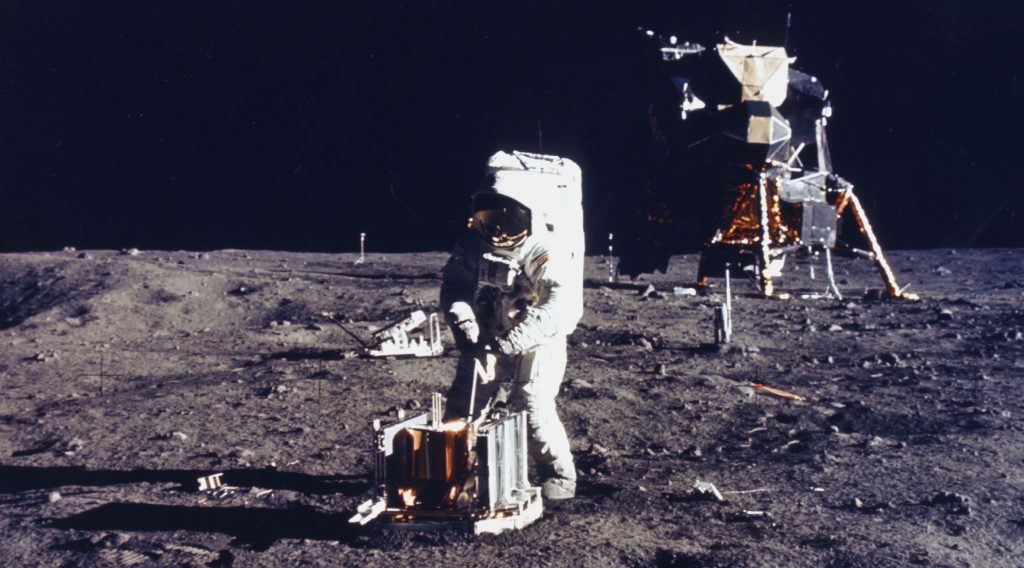
Yes, we must be discerning to filter out the truly negative, depressing people from our teams, but I think we would all be better off if we put a little less emphasis on positivity; and instead tried to find more people that will hold up the standard of our work. A little less focus on cultural harmony and a little more on people who will hold up a mirror of mutual accountability. And maybe we could reach our goals faster if we saw disgruntled talent for what they are – the positive force of change and improvement. It might not be as easy to hire, work for, or manage a disgruntled person — but there are some serious upsides.
Magnetry. Never be content with your content.
I once worked at an agency that couldn’t afford the building it was in. It was literally four or five times larger than what made any logical sense. Don’t get me wrong, it was a beautiful space – but it was an albatross hanging heavily around the necks of everyone. The agency simply couldn’t make enough money to pay for the walls and square footage—yet we remained. Long after we should have. Because of ego. (And despite my best efforts.)
Ego is what makes a business move into a building they can’t afford and to put on airs about their success. “Look how successful we are!” When you start an agency the pressure to compete on that level is extremely hard to resist. This agency has a great new building. This other agency installed monkey bars across their entrance. This one has a heliport! On and on it goes.
So far at Magnetry, we have resisted. We have a humble physical office that is perfect for our team, without a whole lot of fuss. It’s not impressive, we could afford more, and some shops might turn their noses down on it. But it works. Literally and figuratively. That doesn’t mean we are staying put forever (we’re starting to get a little full,) but we will always be in an office that is less than what we can afford and we will always put our resources into what we create and into what really matters.
The reason a client comes to an agency (beyond stellar ideas – which we’ll talk about soon) is for that agency to be good stewards of their marketing dollars. It’s a fairly simple and reasonable expectation that unfortunately a lot of agencies get a little skittish about. One of the reasons I started Magnetry was so that I could look clients in the eye and tell them without hesitation that we put more of our budgets into the work than anyone. This makes the work creatively better, the results better and our clients happier. And while providing value isn’t the ultimate goal, it makes doing the best work of our lives every day possible. There’s very little room for the irrelevant in our office. Like a specific address, or a self-promotion onslaught, or entering awards that don’t matter. Everything you see an agency promote, the clients pay for it, and we are careful how we spend our client’s money. Just because I would be embarrassed by how others do so, doesn’t mean they are wrong—that’s their business. We simply have a different approach.
Our space may be simple, but it does have personality.
In an industry all about image, we feel like prioritizing substance is a great differentiator. We aspire to have more bite than bark. This means we may be a bit quieter than other shops. (We love doing the work much more than pointing at it later—we the proverbial, reluctant self-promoters.) You may never gasp at our new office space at whatever the cool address of the moment is; but we have everything we need to make you react to the ideas we present. That’s when we want you excited and speechless.
Creativity is brutally simple. (Not easy but simple.) Early on, I asked myself what do we need to create? What will Magnetry’s talent need to do the type of work I want to encourage? I wrote this short list as the answer back in 2013:
- Functional personal space. Clean, modern, no fuss.
- The best tools and tech for the job. (This isn’t cheap.)
- Time to work. Time for professional development.
- Information and data.
- A boss who will fight for their ideas.
- The knowledge that if a client left, they still have a job.
- Compensation attached to agency success.
I don’t believe that many shops operate this way, because most are run by bankers or account people on a paper-thin margin. You’d think these financial-sensitive leaders would put a priority on spending responsibly, but instead, they put the priority on squeezing every extra minute of productivity out of their team as possible, so they can turn around and afford a penthouse view and other ego-driven overhead. They simply penny pinch on their people and the work, so they can lavish on the veneer of the image business. (This is particularly true in this market, where insecurity seems to rule the day.) The work suffers as a direct result of being bureaucratic, building-rich, and overly account-managed. Employees are hired and fired in sync with business wins or losses. Productivity increases while the work becomes more predictable. Owners try to keep up with the shops in LA. Award show entry fees get paid before the workers get a raise. Image at all costs.
It could be my blue-collar background, but this just isn’t me, even if it makes us look less successful than we really are. I’m okay being the sleeper agency in an industry of show-offs.
There’s a great metaphor when race teams are preparing a car. On the track, everything that doesn’t make a race car go faster, is thrown out. No AC. No passenger seats. No lights. No dead weight. It all goes, so they can get a little lighter, a M.P.H. faster, or just a tick more aerodynamic. We’ve followed a similar model. We’ve thrown out a lof of bureaucracy, layers, rules, roles and old methods all in the name of doing better work. This doesn’t make for the prettiest agency in the world, but that’s not our goal. We’re in it to be the leanest and meanest creative agency you can find, not necessarily the one with the coolest space or biggest mouth.
We invest in our people and in our ideas and not a whole lot else. We’re focused on making the very next project great which is difficult enough. Our hope is that the rest will take care of itself. Ego be damned.
(That would look really good on a flag.)
I get asked a lot, “What does Magnetry do—what’s your capability?
That’s right after I’m asked, “What’s your agency’s name again?”
The first is a fair question because there is a huge range of offerings between agencies. (The second is fair also, since Magnetry is a made-up word.) Some agencies are full-service, while others specialize in a particular discipline. There are media agencies, digital agencies, creative agencies, management agencies and agencies that don’t really know what they are. Most default and simply put a laundry list of offerings on their site in the futile hope to appeal to everyone. And some (you know who you are) just lie about what they can do. What?!? Agencies lie? It’s true, Pollyanna, they do. And how.
We too have a comprehensive set of skills—honestly though—and that’s by design. On this very site, we list a wide range of capabilities and areas where we feel strongly that we can deliver as good if not better than anyone. This is especially true when you factor in our costs versus other shops. I’m quite proud of what we can accomplish within these walls, but our best skill and our most valuable asset is something that is much harder to cheat. Other agencies try, but all you have to do is look at the work they produce. It’s what separates the pros from the pretenders.
So What’s Our Secret Sauce?

Don’t hire us for our ability to code. Or our design skills. Or our penchant for strategy. Or even for our ability to solve a problem. Hire us because we have taste. Taste is the secret ingredient that makes every dish taste better. Taste is the ability to discern between similar ideas and know what will work better. Taste is the ability to know why something isn’t working and what to do. Taste is why some things just look, sound, and work more effectively. Taste is really the ability to take in data, research, and less concrete input and make a good decision. With taste, you can fix just about anything and when your agency has it, you can trust them in any situation. Taste = Trust.
But taste can’t be faked. It also can’t be bought. It has to be earned. We’ve earned it with many decades of solving problems. We’ve earned it with international experience working across cultures and across national boundaries. We’ve earned it by educating ourselves at the best creative proving grounds in the world. And we’ve earned it with many, many long hours tweaking, iterating, and re-working ideas that others would have been merely content to produce. That’s what taste does to us internally, it forces us to recognize when our own work could be better. (Guess what? We haven’t come close to our best work yet – and that work could be done for you. Taste tells us that.)
This may sound braggadocious, but taste is the difference between actually doing and simply talking a good game. I think of taste as a concrete discipline when hiring our people, it’s that important. And althought you’ll never see it on an RFP, you must have it to work at Magnetry. It’s what makes Dave Grohl rock harder than Chad Kroeger, Tesla cooler than Toyota, and Thomas Keller more savory than Guy Fieri. We have it, and we won’t even charge you more for it. We simply bake it into everything we do.
AZ
688 W 1st St #5
Tempe, AZ 85281
602.795.9990
frontdesk@magnetry.com
LA
1651 23rd St
Manhattan Beach, CA 90266
310.699.9214
frontdesk@magnetry.com

